| Srl | Item |
| 1 |
ID:
068279
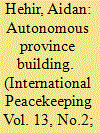

|
|
|
| 2 |
ID:
106665
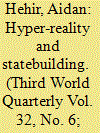

|
|
|
|
|
| Publication |
2011.
|
| Summary/Abstract |
A characteristic feature of many contemporary international administrations of post-conflict territories has been the reluctance of the administrating body to rescind its competences. International administrations have legitimatised their maintenance of key competences on the basis that the societies they administer have yet to achieve stipulated benchmarks indicative of a capacity for complete self-government. This paper offers a post-structuralist analysis of the unwillingness of international administrations to cede control to local institutions and draws in particular on Jean Baudrillard's theory of hyper-reality. Baudrillard identified the means by which, as part of a process of self-identification, a simulated world has come to replace reality and our perception of things has become corrupted by a perception of a reality that never existed. Thus entities and phenomena are imbued with characteristics they do not and cannot have, yet are treated as though they do. In the context of statebuilding this has been manifest in the desire to create political communities which mirror an idealised and unreal vision of the Western state.
|
|
|
|
|
|
|
|
|
|
|
|
|
|
|
|
| 3 |
ID:
068741
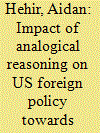

|
|
|
| 4 |
ID:
170464
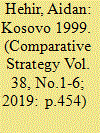

|
|
|
|
|
| Summary/Abstract |
This article argues that the optimism about the future of humanitarian intervention prevalent post-Kosovo in 1999 stemmed from a fundamental misreading of the underlying dynamics that impelled that intervention. The intervention in Kosovo was welcomed because it was said to have occurred due to a confluence of two factors, the leverage exercised by global civil society and the power wielded by the West. I argue that, while global civil-society activists unsurprisingly welcomed the intervention because it cohered with their normative vision of humanitarian intervention, the actual influence of global civil society on the decision to intervene was minimal. Likewise, the then prevalent belief in the immutable primacy of the West and its inherent commitment to the protection and promotion of human rights has proved mistaken in the years since, as Western power has waned and Western support for human rights has been selective rather than principled. Having highlighted how these two core features of post-Kosovo optimism have fared since 1999, I illustrate these trends through an examination of the fate of the responsibility to protect (R2P), which emerged as a direct result of the controversy surrounding the Kosovo intervention.
|
|
|
|
|
|
|
|
|
|
|
|
|
|
|
|
| 5 |
ID:
078716
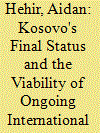

|
|
|
|
|
| Publication |
2007.
|
| Summary/Abstract |
Since June 1999 Kosovo has been under UN administration pending the determination of its final status. Following the province-wide riots in March 2004 the international administration acknowledged that the 'standards before status' policy then being pursued was undermining stability and inter-communal dialogue. Thereafter various ostensibly new initiatives have been implemented to accelerate the process towards final status and the removal of the international administration. This article, however, will demonstrate the continuities between the old and new policies. It will additionally argue that the policies advanced by the Eide Report, the International Commission on the Balkans and the recent Ahtisaari Proposals, regarding the extension of the international administration and the (inconclusive) status of Kosovo threaten stability in the region and do little to resolve the underlying problem
|
|
|
|
|
|
|
|
|
|
|
|
|
|
|
|
| 6 |
ID:
122088
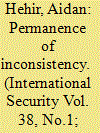

|
|
|
|
|
| Publication |
2013.
|
| Summary/Abstract |
Many observers heralded the Security Council-sanctioned intervention in Libya in March 2011 as evidence of the efficacy of the responsibility to protect (R2P). Although there is no doubt that the intervention was significant, the implications of Resolution 1973 are not as profound as some have claimed. The intervention certainly coheres with the spirit of R2P, but it is possible to situate it in the context of a trajectory of Security Council responses to large-scale intrastate crises that predate the emergence of R2P. This trajectory is a function of the decisionmaking of the five permanent members of the Security Council (P5), a group guided by politics and pragmatism rather than principles. As a consequence, the Security Council's record in dealing with intrastate crises is characterized by a preponderance of inertia punctuated by aberrant flashes of resolve and timely action impelled by the occasional coincidence of interests and humanitarian need, rather than an adherence to either law or norms. The underlying factors that contributed to this record of inconsistency-primarily the P5's veto power-remain post-Libya, and thus the international response to intrastate crises likely will continue to be inconsistent.
|
|
|
|
|
|
|
|
|
|
|
|
|
|
|
|
| 7 |
ID:
097808
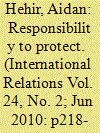

|
|
|
|
|
| Publication |
2010.
|
| Summary/Abstract |
The term 'Responsibility to Protect' (R2P) has dominated debate on humanitarian intervention since the publication in 2001 of the report of the International Commission on Intervention and State Sovereignty (ICISS). Today 'R2P' has become a seemingly obligatory reference point for all researchers in this field and R2P's near ubiquity is testament to the effective marketing of the idea. This article will argue, however, that the currency of the term obscures its hollowness. R2P has undeniably changed the discourse surrounding humanitarian intervention, and possibly broadened interest in the subject, but it has contributed little of substance or prescriptive merit. Though the report was drafted with the mandate to reconcile international human rights with state sovereignty it fudged the key issues, namely, substantive reform of the United Nations Security Council, the legitimacy of unilateral humanitarian intervention and the threshold for intervention. The shift in focus from response to prevention since 2001 evades the key issue which prompted the ICISS to draft its report and fails to provide a viable or innovative approach.
|
|
|
|
|
|
|
|
|
|
|
|
|
|
|
|
| 8 |
ID:
145727
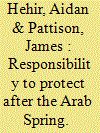

|
|
|
|
|
| Summary/Abstract |
The Responsibility to Protect (R2P) has become the pre-eminent framework for discussing humanitarian intervention and issues related to human rights protection generally. Its origins lie in the 2001 report of the International Commission on Intervention and State Sovereignty (ICISS), which first proposed the notion of the ‘Responsibility to Protect’. Its adoption at the 2005 United Nations (UN) World Summit, with over 160 heads of state in attendance, has led to numerous inter-disciplinary debates within academia and beyond. The R2P has often been controversial, but the eruption of the ‘Arab Spring’ in late 2010 has constituted the concept’s most exacting test and prompted a further spike in interest in both its efficacy and desirability. The articles in this special issue assess the R2P in light of the events during, and debates surrounding, the Arab Spring. Together, they constitute a uniquely focused assessment of this significant and influential doctrine.
|
|
|
|
|
|
|
|
|
|
|
|
|
|
|
|